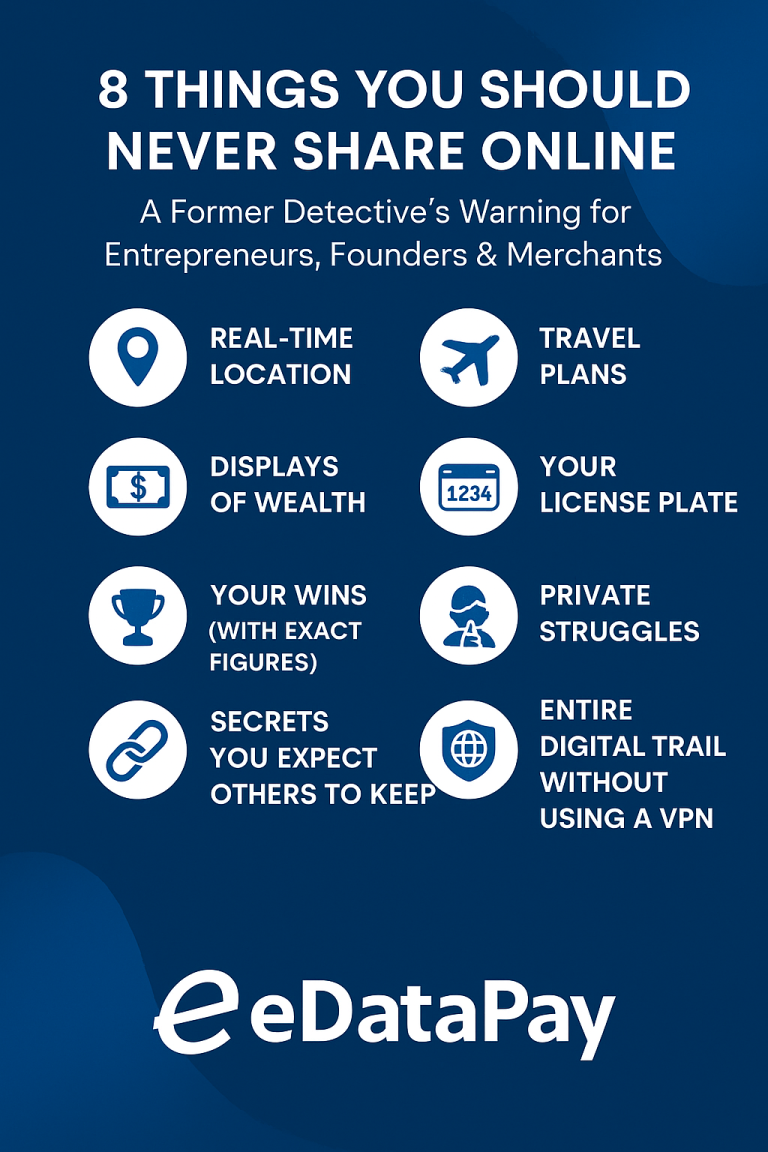Privacy is power
Criminals are watching. And if you’re building a business or personal brand online, your oversharing could be turning you into a target.
At eDataPay, where we work with founders, merchants, and ISOs worldwide, we know security starts before the payment gateway. It starts with what you post online.
Here are 8 things you should never share online — and what to do instead:
- Real-Time Location
Posting where you are right now is a blueprint for robbers or stalkers.
Do this instead: Delay posts until after you leave. Disable geotags. Set your camera to remove metadata.
- Travel Plans
Sharing hotel names, boarding passes, or countdowns to your trip? You just told burglars when your home will be empty.
Do this instead: Post travel stories when you return. Keep it vague before and during.
- Displays of Wealth
Luxury cars, expensive watches, and cash photos attract criminals, not clients.
Do this instead: Show your impact and insights, not your shopping list.
- Your License Plate
Thieves can trace plates to names, addresses, and even VINs.
Do this instead: Blur or crop out plates and parking permits before posting.
- Your Wins (With Exact Figures)
Public wins attract private haters. Bragging about money or deal size creates unnecessary exposure.
Do this instead: Share lessons, not numbers. Educate, don’t flex.
- Private Struggles with the Wrong People
Not everyone clapping is on your side. Some people gather info to gossip or sabotage.
Do this instead: Share challenges only with trusted allies. Test people before trusting them.
- Secrets You Expect Others to Keep
“If you tell someone, expect it to be shared,” warns Alex. Even well-meaning friends can leak sensitive info.
Do this instead: Treat your plans as confidential IP. Reveal only what’s necessary—and only to the right people.
- Your Entire Digital Trail Without Using a VPN
Every time you log in without a VPN, you’re broadcasting your IP, location, and behavior.
Do this instead: Use a trusted VPN to encrypt your connection and protect your browsing and business activity—especially on public Wi-Fi.
Why This Matters for Founders & Fintech Leaders
As we found out , In 2021, identity theft affected over 42 million U.S. adults, causing $52 billion in fraud losses. Many cases start with breadcrumbs left on social media.
- As fintech and digital commerce leaders, you’re high-value targets.
At eDataPay, we help merchants and startups scale safely through:
Secure payment infrastructure
Fraud prevention tools
Smart onboarding and KYC
Best practices for online privacy
Final Thought: Protect Your Brand by Protecting Your Privacy
You don’t need to disappear from the internet—but you do need to post with intention.
🔐 Delay location sharing
🔐 Blur sensitive info
🔐 Stay quiet about your wealth and plans
🔐 Use a VPN
🔐 Share value, not vulnerability
Privacy isn’t hiding. It’s strategy.
Want help securing your payments and digital presence?
Connect with the team at eDataPay or visit www.edatapay.com
#PrivacyIsPower #MerchantSecurity #Fintech #eDataPay #DigitalRisk #Founders #amplipay#OnlineSafety #PaymentGateway #BusinessTips #MerchantTips #Cybersecurity #chatgpt #bitcoin








